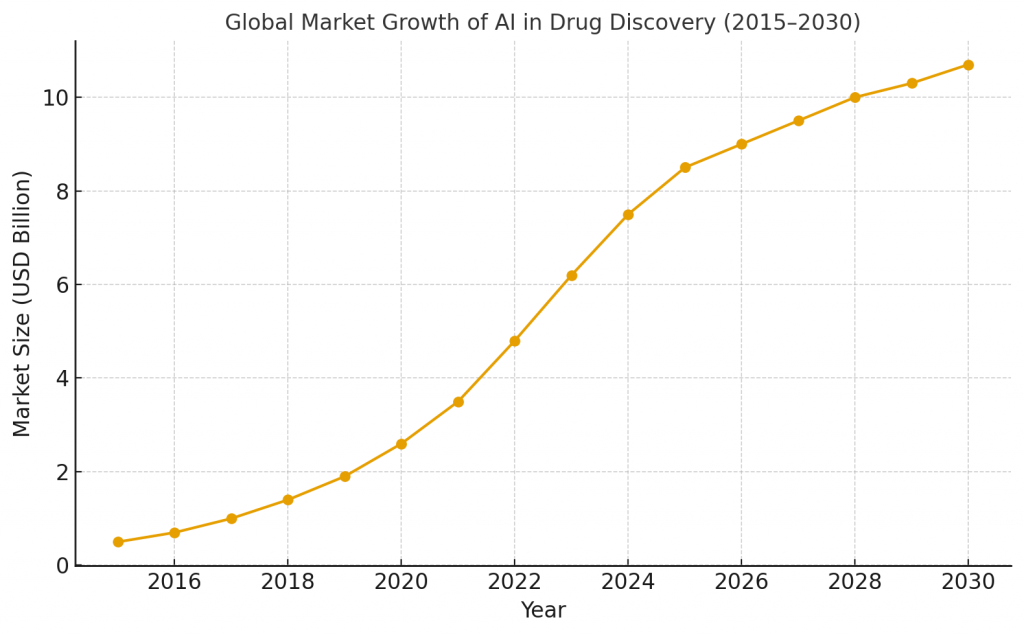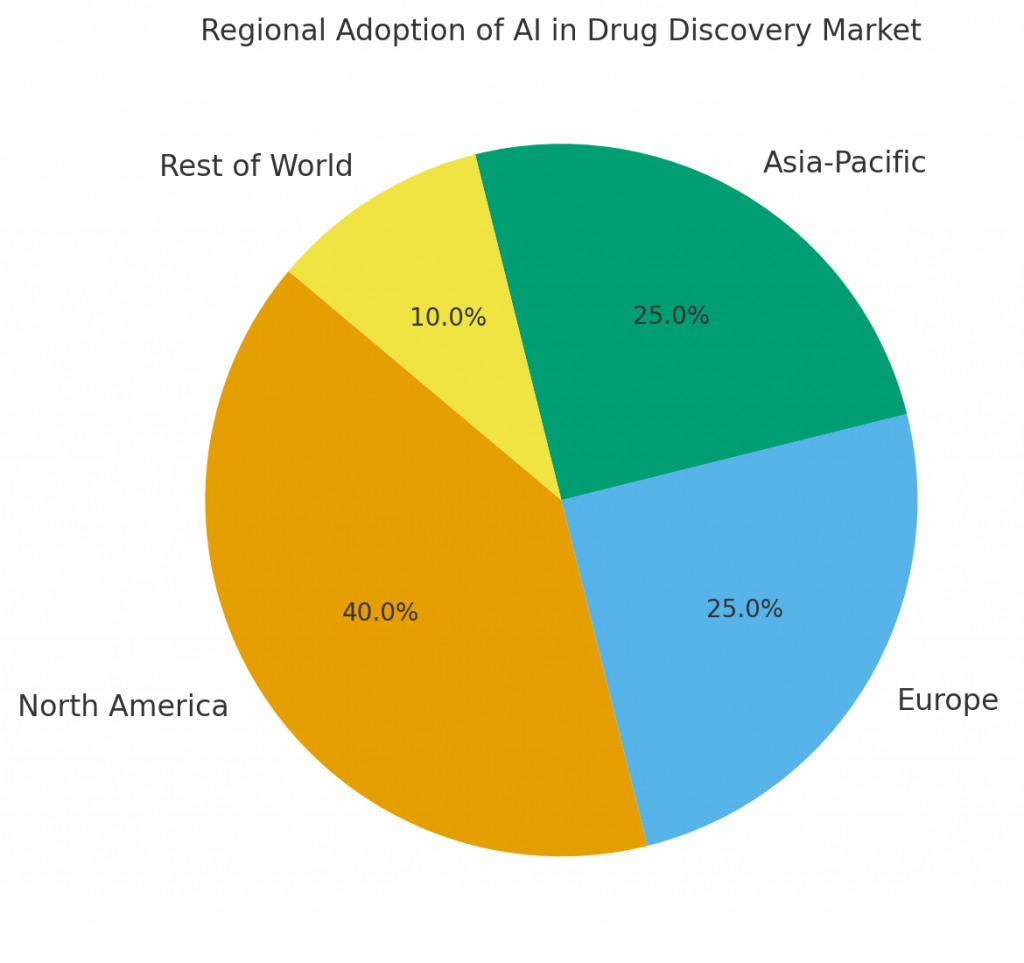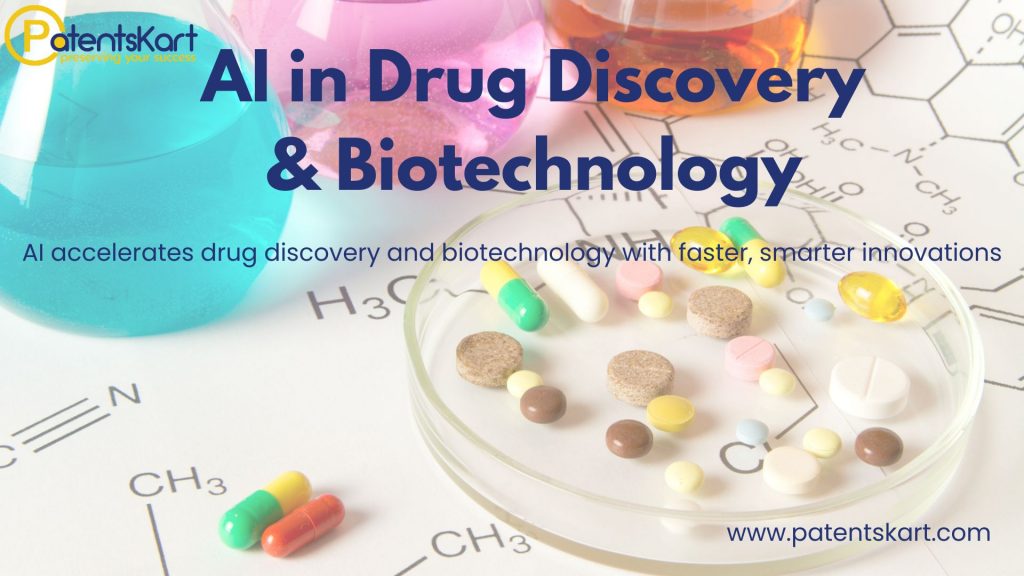Introduction
Drug discovery has always been one of the most complex, costly, and time-intensive processes in modern science. Developing a single successful drug can take 10 to 15 years and billions of dollars, with countless failures along the way. In this environment, many ask: is there a faster, smarter, and more efficient way to find new medicines?
The answer increasingly points to AI in Drug Discovery. By combining computational power with biology and chemistry, artificial intelligence is reshaping how scientists discover, test, and deliver drugs. From identifying new targets to optimizing clinical trials, AI is reducing costs, improving accuracy, and accelerating timelines. This blog will explore every detail: what AI in drug discovery means, how it works, its applications, challenges, future outlook, and why securing intellectual property is critical.
What Is AI in Drug Discovery and Why Does It Matter?
At its core, AI in drug discovery refers to using machine learning, deep learning, and advanced algorithms to analyze massive datasets and generate insights that guide drug development. Traditional discovery methods depend on trial and error, animal testing, and labor-intensive lab work. AI reduces this dependency by predicting how molecules will behave in the body, identifying potential drug candidates faster, and suggesting new therapeutic pathways.
This matters because:
- Efficiency gains: What once took years can now be done in weeks.
- Cost savings: Early-stage drug development costs can be cut by up to 40%.
- Higher accuracy: AI models spot hidden relationships in data that humans might overlook.
- Broader reach: AI opens new opportunities in rare diseases, oncology, and precision medicine.
In short, AI in drug discovery is a game-changer for pharma and biotech, unlocking treatments that were previously too complex or too costly to pursue.
How Does AI in Drug Discovery Work?
Many wonder: what powers AI in drug discovery behind the scenes? The process relies on a mix of technologies:
- Machine Learning (ML): Algorithms trained on biological and chemical data to predict outcomes, such as how a molecule binds to a target protein.
- Deep Learning (DL): Neural networks that analyze complex patterns, including medical images, molecular structures, and gene interactions.
- Generative AI: Models that design completely new molecules by simulating properties and predicting interactions.
- Natural Language Processing (NLP): Scanning research papers, patents, and clinical data to extract useful information.
- Omics Integration: Analyzing genomics, proteomics, and metabolomics data to connect biology with drug discovery.
Together, these tools enable a data-driven approach that is far more predictive and scalable than conventional methods. Instead of screening millions of compounds in the lab, researchers can simulate outcomes digitally, saving both time and resources.
What Are the Key Applications of AI in Drug Discovery?
1. Target Identification and Validation
AI in drug discovery helps scientists understand disease mechanisms by analyzing biological pathways and pinpointing proteins or genes that may serve as drug targets.
2. De Novo Drug Design
Generative AI models create entirely new molecular structures with desired properties. Instead of testing random molecules, researchers begin with AI-suggested candidates that already look promising.
3. Drug Repurposing
AI in drug discovery uncovers new uses for existing drugs, which is especially valuable for rare diseases and urgent needs such as pandemic responses.
4. ADMET Prediction
ADMET (Absorption, Distribution, Metabolism, Excretion, and Toxicity) properties are critical for safety. AI predicts these properties early, reducing late-stage trial failures.
5. Precision and Personalized Medicine
AI integrates patient data, including genetic and lifestyle factors, to design therapies tailored to individuals. This moves healthcare toward personalized drug response prediction.
Each of these applications contributes to faster development, lower costs, and better outcomes — the ultimate goal of any pharmaceutical innovation.
How Does AI in Drug Discovery Benefit Biotechnology Development?
AI isn’t limited to pharma — it is also transforming biotechnology. Common applications include:
- Protein Structure Prediction: Deep learning models, such as AlphaFold, provide accurate 3D protein structures that were once extremely difficult to determine.
- Synthetic Biology: AI optimizes metabolic pathways, enabling the creation of genetically engineered organisms for medicine, agriculture, or environmental use.
- CRISPR/Cas9 Target Optimization: AI improves gene-editing precision by predicting where edits will succeed or fail.
- Biomanufacturing: AI systems monitor and optimize large-scale production, reducing waste and ensuring quality control.
By enabling faster innovation cycles and improved reproducibility, AI in drug discovery strengthens biotech’s ability to tackle global challenges — from pandemics to food security.
How Is AI in Drug Discovery Improving Clinical Trials?
Clinical trials are expensive, risky, and often the biggest bottleneck in drug development. AI in drug discovery addresses these challenges by:
- Enhancing patient recruitment: Matching patients to trials using genomic and health record data.
- Real-time monitoring: Using AI-powered wearables and sensors to collect and analyze patient responses continuously.
- Predictive modeling: Estimating trial success probability and identifying potential safety concerns before they become critical.
- Adaptive design: Adjusting trial protocols based on AI insights without compromising scientific rigor.
The result is more efficient trials with higher success rates, shorter durations, and safer outcomes.
What Does the Market Landscape Look Like for AI in Drug Discovery?

The market for AI in drug discovery is experiencing rapid growth, with projections estimating it will exceed USD 10 billion by the early 2030s.
Leading Companies
- Established players: Pfizer, Novartis, and Roche are integrating AI into R&D pipelines.
- Specialized startups: Insilico Medicine, BenevolentAI, Atomwise, Exscientia, and Recursion are leading innovation.
- Collaborations: Pharma companies partner with AI startups to license platforms, co-develop drugs, or form joint ventures.
Regional Trends

- North America dominates due to advanced infrastructure and strong venture funding.
- Europe is adopting AI with an emphasis on regulatory compliance and ethical standards.
- Asia-Pacific is the fastest-growing region, led by China and India’s strong biotech ecosystems.
This combination of global adoption and cross-industry partnerships makes AI in drug discovery a central theme for the future of healthcare.
What Are the Challenges in Adopting AI in Drug Discovery?
Despite the excitement, challenges remain:
- Data Quality and Availability: Poor or biased datasets limit model reliability.
- Regulatory Uncertainty: Agencies are still developing frameworks to evaluate AI-generated insights.
- Ethical Concerns: Bias in algorithms can create unequal healthcare outcomes.
- Integration Issues: Traditional pharma workflows often resist rapid digital adoption.
- High Initial Costs: Building AI infrastructure and training models requires significant upfront investment.
Addressing these challenges will be key to scaling AI in drug discovery across the industry.
What Is the Future of AI in Drug Discovery?
Looking ahead, AI in drug discovery will continue to evolve:
- Self-Driving Labs: Fully automated labs where AI designs, tests, and optimizes compounds without human intervention.
- Generative Biology: AI designing not only drugs but also new biological systems to combat complex diseases.
- Rare and Neglected Diseases: AI making drug discovery cost-effective enough to pursue less profitable but socially critical conditions.
- Integration with Healthcare Systems: AI linking EHRs, diagnostics, and drug development for a unified approach.
In the long term, AI in drug discovery will reshape pharma into a predictive, data-driven, and highly efficient industry.
FAQs
1. How does AI in drug discovery reduce drug development time?
By simulating molecule behavior and predicting outcomes digitally, AI cuts years from the early-stage discovery process.
2. Is AI in drug discovery reliable for clinical outcomes?
Yes, but reliability depends on high-quality data, transparent algorithms, and strict regulatory oversight.
3. Which companies are leading AI in drug discovery today?
Startups like Insilico Medicine, BenevolentAI, and Exscientia, along with big pharma players like Pfizer and Novartis.
4. Can AI in drug discovery be applied to rare diseases?
Absolutely. AI enables cost-efficient exploration of rare and orphan diseases that traditional models often ignore.
5. How can a biotech startup adopt AI in drug discovery?
By partnering with AI platform providers, collaborating with pharma, or working with firms like PatentsKart to secure IP and strategy support.
How PatentsKart Can Help
PatentsKart supports innovators by bridging the gap between AI-driven drug discovery and intellectual property strategy. Our services include:
- Patent landscaping to map opportunities and risks.
- Freedom-to-operate analysis for AI-based platforms.
- IP protection for AI-driven molecules, algorithms, and biotech processes.
- Competitive intelligence on global AI adoption in drug discovery.
By securing your innovations, we ensure your breakthroughs are both scientifically impactful and commercially protected.
Conclusion
The rise of AI in drug discovery marks a turning point for pharmaceutical and biotech industries. By integrating advanced algorithms with biology, the industry is moving toward faster, safer, and more precise healthcare solutions. While challenges exist, the future is clear: AI will be central to how the world develops new medicines.
For expert support in navigating this space, visit patentskart.com or contact us at info@patentskart.com.







